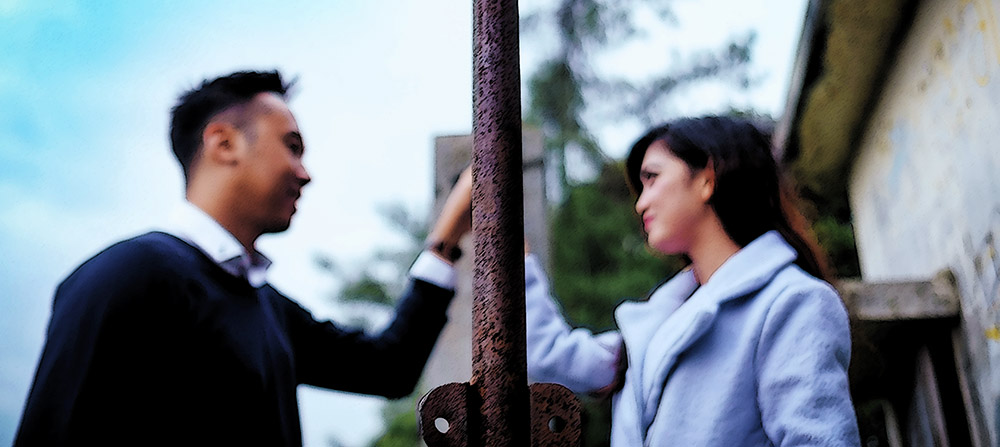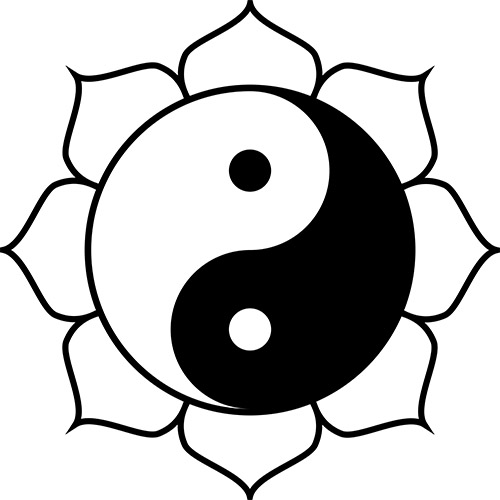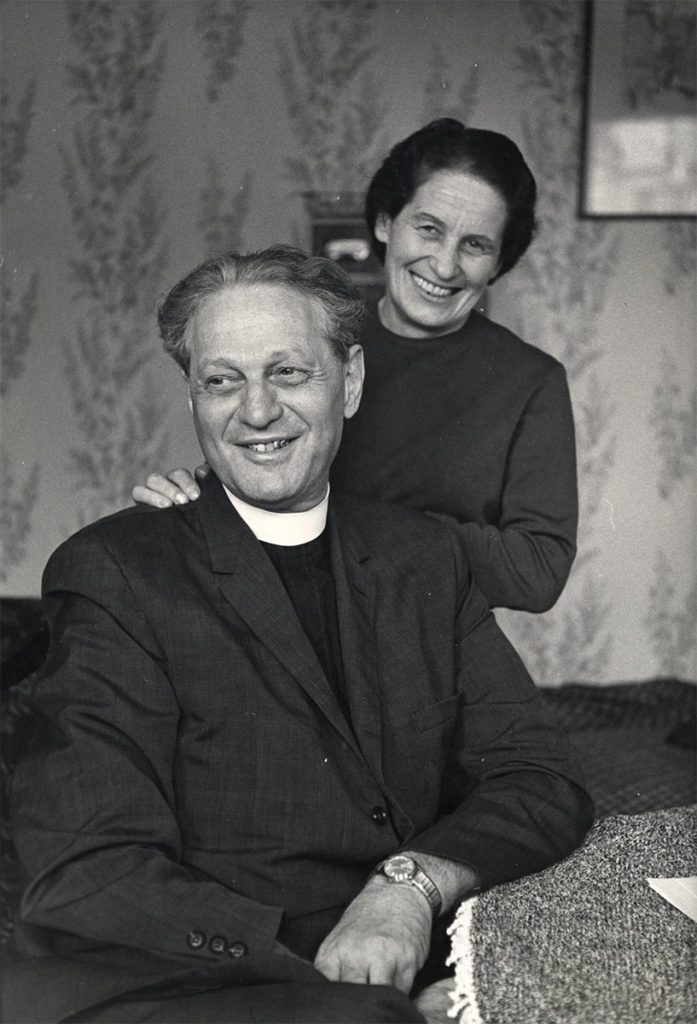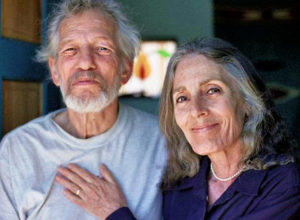
[Sunday service reader stands and reads from Whispers From Eternity, Prayer Number 147, “Demand not to be enslaved by the ego or by passivity.”]
I want to use my own will; but lead it, O Father, for use in the golden paradise of all fulfillment. For I would be infinitude’s happy child, knowing that Thou hast not limited me behind the prison bars of fruitless desire and withered hope.
I would break the shameful cords of lethargy, and step forth in fearless freedom, to blaze my way through forests of limitations and delusions.
O! My little, vain ego may strut in pride, saying : “Behold my glory! Worship me!” But I will look; beyond its shadowy form and see the unimaginable beauty of Another Form. The silence-tuned ears of my soul shall ignore the tiny, boasting masquerader, impersonating Thee, and listen in rapture to the wind-winged, fragrant music of Thine own matchless voice, whispering across the ages: “I am He!”
[Asha begins her talk.]
Swami Kriyananda said that his spiritual life was largely formed by Paramhansa Yogananda’s book Whispers From Eternity. Which is an interesting statement, since Yogananda explains for us in that book how we can relate to God in every facet of our lives.
Whispers talks about the most mundane issues; it tells us how to handle criticism, the solution to poverty, how to deal with nagging relatives, and how to cope with our failures and realize our aspirations.
 And while it may not be obvious at first glance just how practical each verse is, because the language is so bold, the very boldness of the language shows us, with urgency and energy and enthusiasm, how we can move through this world in the constant remembrance of God.
And while it may not be obvious at first glance just how practical each verse is, because the language is so bold, the very boldness of the language shows us, with urgency and energy and enthusiasm, how we can move through this world in the constant remembrance of God.
Today is Father’s Day, which comes as a companion to Mother’s Day roughly a month earlier. And at this particular time in history, when everybody is wanting to push the feminine forward, it’s particularly important that we don’t lose sight of the importance of both sides of the coin. In the movement to gender-neutralize everything, including the scriptures, we need to understand that we may be overlooking an extremely important truth.
I find that the Yin-Yang symbol, which most of us are familiar with, offers an easy way to visualize this issue. It’s a circle divided into equal curving parts that are linked together to make a whole. And looking at the symbol, it’s easy to understand how both sides are necessary – the receptive Yin, and the stalwart, initiating Yang. These two forces are necessary to complete the picture, both within ourselves and in the world.
To create anything worthwhile, both of these forces need to have their place. It’s interesting, for example, to observe how the Yin/Yang energies play out in our human relationships. With an excess of Yang, we find people becoming overly aggressive and caring too little for the home. And with an excess of Yin, everybody wants to huddle at home, and nobody wants to exert the courage to step out and meet the world on its own terms.
Men and women are the physical expressions of highly elevated and very subtle cosmic Yin and Yang energies that are manifested through these dual forms.
The Yang side of the equation, the masculine, helps us stand calmly in the midst of life’s howling winds, and the power of Yin is needed to take care of the details and see how everything is affecting everything else, and bring the whole into a harmonious balance.
Yet our Yin efforts to bring everything into balance may end up causing us to spin in circles, if we neglect the steadying influence of the Yang, which allows us to stand strong amidst the cross-currents swirling around us.
These two energies are self-evidently the twin sides of a single coin, and when we lose ourselves in either one of, forgetting that only a perfect balance of the two will ever truly fulfill us, we find ourselves flailing in confusion.
I’m not talking politics. I’m not talking social oppression. I’m not talking anything manifested in this world. I’m talking about the higher cosmic realities behind this world. Because the more clearly we can relate to the world with an understanding of the higher truths, the more we will be able to enjoy an inner sense harmony with those truths, and at peace in our hearts and with the world around us.
I was fortunate to grow up in a household where there was a very nice balance between the mother and father energies. We were an intact family, and my parents loved each other to the end of their lives, through fifty-six years of marriage.
 I was fortunate to have in my father a wonderful example of what appropriate masculine energy looks like, and when I left my earthly father I met my spiritual father, Swami Kriyananda. And in both cases, I learned not to fear or rebel against the Yang energy, but to respect both sides, and to strive within myself to be neither male or female but an expression of the perfectly balanced whole. Because that is what it takes to achieve the true happiness and freedom that we all are longing for.
I was fortunate to have in my father a wonderful example of what appropriate masculine energy looks like, and when I left my earthly father I met my spiritual father, Swami Kriyananda. And in both cases, I learned not to fear or rebel against the Yang energy, but to respect both sides, and to strive within myself to be neither male or female but an expression of the perfectly balanced whole. Because that is what it takes to achieve the true happiness and freedom that we all are longing for.
When the firmness of the Yang energy is in place, blended with heart-opening Yin qualities of kindness and compassion, only then will our world be what we want it to be. And many times along the way it will be necessary to make large or small course corrections, because we have a tendency to swing too far in one direction or the other.
This is the nature of duality, where if we aren’t perfectly centered we will tend to spin off in one direction or the other. And the need to find the right balance isn’t ultimately a question of trying to make a heaven on earth, but of finding a balance within ourselves so that we can grow deep and strong in the everlasting truths.
Society comes and goes, but at the moment when we exit this planet, the only thing we will be able to take with us will be our consciousness. And the only thing of value that we will leave behind will be the good that we’ve done in this world, and above all the good that we’ve been able to do by serving as instruments for the light.
We’re now in June 2020, in the midst of the COVID-19 pandemic, and many of us are living in relative isolation and under tight restrictions on our movements. And for those living in our Ananda communities, the experience has had a slightly different flavor than for people who are living alone, or who are accustomed to drawing their reality from the world outside them.
I read a moving book by Sabina Wurmbrand, the wife of Reverend Richard Wurmbrand. Richard was born in Romania, and when the Nazis came he was persecuted as a Jew, and then after he converted to Christianity the communists came and he was persecuted again as a Christian, and Richard and Sabina were both imprisoned for their faith.
It was a very brutal time, when people in communist Romania could be arrested and taken away in a moment. Sabina tells how there were women in the prison who had been out to dinner when they were arrested, and they were imprisoned in their evening gowns, and no other clothes were given to them.
Now, the prison was difficult for everyone, but Sabina said that it was simpler for her by comparison, because her relationship with Jesus was always her primary reality.
In fact, the reason they had come to the attention of the authorities in the first place was that the communist regime had called all of the pastors together, and they had coerced some of them to renounce their faith in favor of the communist doctrine. So there were people at the meeting who were supposed to be representing Jesus, but who stood up and represented the opposite philosophy instead. And Sabina turned to Richard and said, “Someone must wipe this stain from the face of Jesus.”
Richard turned to her and said, “If I stand up now, you will have no husband.” Meaning that he was sure to be arrested, and perhaps killed.
Sabina said, “If you don’t stand up, I have no husband.”

So he stood up, and they were imprisoned, and their son was left on the street, although he fortunately knew where to go, and he was taken care of.
But they abandoned everything because the love of God was more important to them than anything else.
We haven’t been tested in the same way, and I often wonder, if such a day were to come, what we would be inspired to do?
I once asked Swami, “If I am ever in a concentration camp, and a guard begins to brutalize the person standing next to me, do I insert myself into the fray in order to protect the person next to me, or would that be a foolish waste of my human life?”
It was a question that had been on my mind throughout my teenage years, and I realized that Swami Kriyananda was a person I could ask about it. So I said, “What should I do?”
And in his impersonal fatherly wisdom, which I relied upon as much as his unconditional motherly love, he lifted the question to the level where I was asking it.
He said, “What you are asking is, in a moment of crisis, what does God want you to do?”
Because the difficulty would be that if I intervened, losing my own life would be quite secondary to the risk that others might suffer as a result of my actions. And if I would sacrifice my life for the sake of another, it would be something that you would simply do. But what if it so enraged our captors that it would cause the whole group to be brutalized or killed? And in such a moment, how would we know what God wants us to do?
Swami said, “The only way you can know in a moment of crisis is to have practiced when it was easier, and then the mind will be in the habit of turning to God first for guidance in any situation.”
Because your heart will be trained to go straight to the Spirit, and you’ll know what the answer is. And so, “Practice when it is easier” has become a personal guideline and motto in my life – to practice in the moment at hand, because we never know what the next moment might bring.
The highest reality of Sabina Wurmbrand’s life was, first and foremost, her relationship with Jesus, and only secondarily the context in which that relationship was taking place. It was why she could speak so courageously to her husband, affirming that the basis of their relationship was their dedication to Jesus, and telling him that if he would allow Jesus to be shamed by the traitorous pastors who ought to be speaking out in his name, he would have betrayed the entire covenant of their life and their marriage.
Sabina wrote beautifully about how Jesus was with her even in prison. And sometimes it was difficult for her to feel his presence, because the conditions were so extremely trying and distracting.
But then she spoke of those who had arrived in their evening dresses and who had no inner life, because their entire concern was for the dress they would wear today, and the dress they would wear tomorrow, and how they would get their hair done, and what others were doing and thinking, and the beautiful places they could go. Because most people define their lives from the outside. And if it’s all taken away, what is left? And this is why Sabina did her best to minister above all to those women, because they were far more lost than she was.
There’s an interesting concept that I learned from one of the first books on dying that was published decades ago, before the hospice movement started, when people were just beginning to think about the transition to death. The author, Stephen Levine, was among the early pioneers, along with Elisabeth Kübler-Ross and others. And he made a very interesting observation about the people who didn’t die quickly, but had to spend considerable time on their deathbeds, where other activities were impossible and all they could do was lie there as the life force gradually waned out of them.

He described a period of extreme restlessness that most of those dying people would go through. And, being a meditating devotee himself, he observed that whenever there is a discomfort in our consciousness, most of us will try to do something with our bodies to distract ourselves. Or we’ll try to use our consciousness to find a way to avoid it or get around it. But he said that it’s always a problem of consciousness. “I’m feeling restless. I feel hungry. I feel lonely. My mood is a little tense. I feel uncomfortable. I’ll go swimming and I’ll feel better. I’ll lie in the sun or call a friend or watch a movie. I’ll go downtown and window shop. I’ll go buy something.”
We have a thought or a feeling that isn’t at perfect peace and that wants a response from us, so we activate the body and we do something, because we’re hoping that it will change our consciousness for the better and we’ll feel more comfortable inside.
But when the life force withdraws to the point where we cannot even move the physical body, our options are greatly limited.
We were with a woman friend of ours who was within days of passing, and her head seemed to be lying at an uncomfortable angle, so one of us said, “Why don’t you lift your head?” And she glanced at us and said, “You have no idea what tremendous effort is required for me to lift my head.” Because there was so little life force remaining in that body, and of course we helped her move her head.
Stephen Levine said, “The person is forced to solve the problems of consciousness only on the level of consciousness.” And isn’t that a marvelous idea? We’re forced to solve the problems of consciousness only on the level of consciousness. And, really, it’s shorthand for the kind of self-mastery that we’re being asked to strive for on the spiritual path. It’s telling us about our need to cultivate an inner relationship, and a place where we can go within ourselves.
Master promised that those who meditate deeply would discover a “portable paradise” within themselves. And we may think of it as the presence of Jesus, or the Divine Mother, or the Heavenly Father, but the assumption is that there is a place within us where we can solve the problem of consciousness at the level of consciousness.
Now, that’s a tall order, isn’t it, because it’s describing the high achievement of a God-realized master who has, in fact, solved all of the problems of consciousness. But at our own level, we can practice when it’s easier, and learn to live in the eternal Now.
I remember asking Swami a question about reincarnation, long ago, and how he misunderstood my question, but how he gave me a better answer.
“What causes us to come back to the material plane again and again,” he said, “is regret and longing.”
What causes us to be uncomfortable in the moment? Regret and longing.
I recently had a tiny impulse of energy that I followed through on, and then I realized that it wasn’t such a good idea after all. It was such a small thing that it was beyond trivial, but I was very interested to witness the consequences. I woke up the next morning with a slight feeling of unease, and I had to think what I might have done that was making me uneasy. And then I remembered, oh, I created that minor kerfuffle yesterday, and I wish I hadn’t. But I woke up with a regret, and the feeling of regret was moving me away from simply being happy to wake up and enjoy the spiritually reminding pictures that are the first thing I see when I open my eyes.
It was just a tiny bit of regret. But if you take it farther, there you are, back in a body again and trying to fix it.
Or maybe it’s a longing – oh, I wish I could go visit my grandchildren today. I wish I weren’t confined. I wish I could go to a concert. I wish the theaters were open. We’re sitting here feeling quite contented, and then some little impulse causes our consciousness to waffle, and we find ourselves regretting or longing, and maybe the longing isn’t positive.
Maybe it’s, “Boy, I’d really like to give him a piece of my mind!” And something takes our awareness away from the fact that everything is fine, and whatever God has sent me, why would I ask for anything else?
If Divine Mother could take me to freedom by any other route, I’m sure She would definitely do so, because She loves me, and if this is the road She has given me, it must be the fastest route from here to there, and there’s simply no point in rebelling against it.
The more deeply we can simply be, instead of running away from those mental oscillations that make us uncomfortable, the more balanced and inwardly at peace we will be.
Someone offered me a very interesting mental exercise for introspection. She suggested that we ask ourselves, “What is this feeling?” Because the first feeling we have sometimes isn’t the true one. We sometimes think we’re feeling angry, for example, when we’re actually just feeling embarrassed.
“What is this feeling?” What does it want? Why is it here? What is it trying to show me? What is forcing this feeling upon me, that I’m not clearly aware of?
And the next question is, can I let it go? Do I really have to hold onto it? Or can I simply receive it and act on its message and let go of it?
Now that we’re in enforced semi-seclusion during the pandemic, and we have a bit more time on our hands, let us use this time, not to regret the age we’re living in, and not to wish that these things weren’t happening, but simply to recognize that we always have time to solve our problems at the level of our consciousness, and sometimes we’re just too restless to notice.
We always need to know what God wants us to do. And let us all practice now while it’s easier.
God bless you.
(From Asha’s talk during Sunday service at Ananda Sangha in Palo Alto, California on June 21, 2020.)
